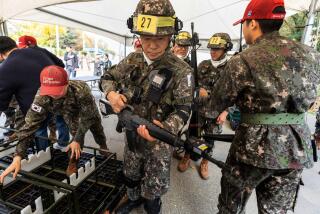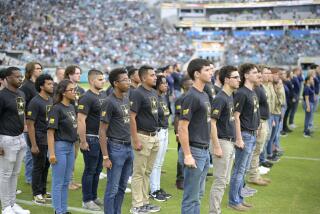GIs’ Enthusiasm for Bosnia Mission Begins to Flag
- Share via
TUZLA, Bosnia-Herzegovina — The lights of the Prestige Caffe shine enticingly across the street from the main gate of the U.S. Army’s headquarters in Bosnia.
The gaily painted little restaurant is just another reminder that somewhere out there, in the outside world, there are fresh-cooked hamburgers for the ordering and ice-cold beer on tap.
Beer! For American soldiers now based in Bosnia--and even far to the rear, in Hungary and Croatia--the hop has become the forbidden fruit.
“There’s nothing there for us,” says Sgt. Cameron Hunt, a sentry from Cypress, with a jerk of his head toward the Prestige and the pleasures beyond.
“We can’t drink beer. We have to wear fatigues all the time. I’ve heard some soldiers say this is like being in prison.”
In the fourth month of their peace-enforcement mission in Bosnia-Herzegovina, some U.S. soldiers are beginning to chafe under the strict regulations imposed to keep them safe and the controversial mission well away from political trouble.
Well-publicized bad experiences elsewhere--the bombed Marine barracks in Beirut, the raped schoolgirl in Okinawa, Japan, the video image of a dead American being dragged behind a truck in Somalia--have shown U.S. Army commanders how quickly public support for a foreign mission can falter.
They’re determined not to let it happen here.
And so, the rules.
Americans participating in Operation Joint Endeavor are not allowed a drop of alcohol, even when off duty and even when they’re in camps way back in peaceful Hungary. Ostentatious flying of the Stars and Stripes is prohibited for fear of creating the provocative image of an occupation force.
Americans are required to carry their weapons at all times, even in the mess. Flak vests and helmets are also de rigueur: “The only time we’re allowed not to wear them is when we’re in the shower,” Hunt says.
Soldiers also carry an anti-chemical-weapons kit, about the size of a shoe box, slung over the shoulder. And the troops at Tuzla are generally forbidden to leave the sprawling, well-fortified base unless they are in convoys of at least four vehicles.
All of which might be tolerable, except that no other soldiers in the 30-nation peacekeeping mission here must live by such restrictions.
The Tuzla-based Americans’ closest neighbors, an encampment of Swedish soldiers 10 minutes away, not only get to drink two beers a day--they have three pubs on base to choose from.
And when they are tired of base life, the Swedes can go off duty and roam the Bosnian countryside.
They can be seen here and there on back roads, blithely pumping mountain bikes over chuckholes or jogging in shorts and T-shirts. Their heads are bare; they carry nothing more to protect themselves than their wits and a jackknife.
For American GIs, accustomed to thinking of themselves as the toughest kids on the block, being cooped up in a lot of armor while the others run free can hurt.
“See that? He’s from the Turkish brigade,” says Hunt, pointing at a soldier walking out through the main gate in a baseball cap. “Are they walking around in their helmets? Absolutely not.”
Much of the Americans’ steam is being blown off these days in letters to the Stars and Stripes, the unofficial newspaper of the U.S. military, based in Germany. The letters page is traditionally a clearinghouse for soldiers’ gripes on all topics, but since the Bosnian deployment started, the paper has been getting three times its usual volume of mail.
Sgt. Mark F. Jenkins, stationed near the airport of the Croatian capital, Zagreb, recently wrote in, lamenting that he is required to stay on his base at all times, except when riding the shuttle bus to another U.S. base in downtown Zagreb. And when he is on the bus, he wrote, he must wear his helmet--though civilians sharing the vehicle seem to feel safe in street clothes.
“One can only imagine what the local populace thinks,” he complained. “It’s all completely unnecessary. The greatest danger in Zagreb is the traffic.”
Downtown Zagreb was bombarded in May 1995, but since then the city has been at peace.
Another pet peeve is the recently imposed restriction--albeit haphazardly enforced--on flying the U.S. flag in Bosnia.
“Imagine how shocked we were when we were told we would no longer be allowed to fly the American flag over our camp,” says Sgt. Robert Neumann, whose unit got a flag as a Presidents’ Day gift from children back home.
The GIs had been proudly holding nightly ceremonies until the ban was issued.
“They are, in effect, taking away the American flag from the very soldiers who have been sent here to serve ‘the republic for which it stands,’ ” Neumann complains.
But the biggest American anguish can be blamed on the alcohol ban.
Soldiers based in Tuzla say they feel patronized; it is a common refrain that if they are old enough to come to Bosnia and take a bullet, then they are old enough to pop a cold one at the end of the day.
“In Korea, there’s never been a peace treaty signed,” said Spc. Jay Harrod, a military policeman from Alabama. “Technically, they’re still at war. But the soldiers in Korea can get off-post passes, and they can drink alcohol. We’ve already signed a peace treaty in Bosnia, but we can’t have a beer after work.”
Out in Bosnia’s remote encampments, conditions are harder but esprit de corps seems stronger; there is far less grumbling about the drinking ban.
There, the soldiers are more exposed and the vigilance seems to make more sense.
The Americans often live just two dozen to a camp, surrounded by mined farmlands and booby-trapped houses. They are sometimes called on to break up villager fights, bandage knife wounds and handle other local emergencies.
“You really don’t get the feeling of overprotection when you’re out here,” said Lt. Randy Ellsworth of El Paso, Texas, the officer in charge of a small camp about an hour’s drive from Tuzla. “There has to be a lot of alertness around here. Alcohol would just be out of the question.”
More to Read
Sign up for Essential California
The most important California stories and recommendations in your inbox every morning.
You may occasionally receive promotional content from the Los Angeles Times.













